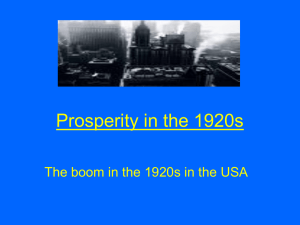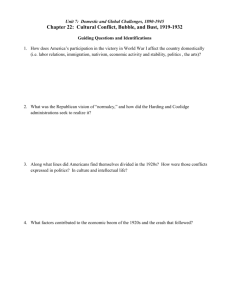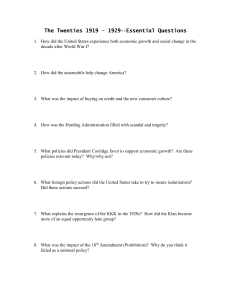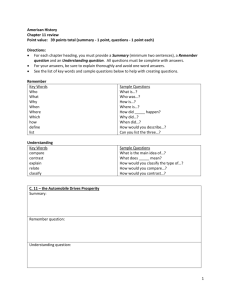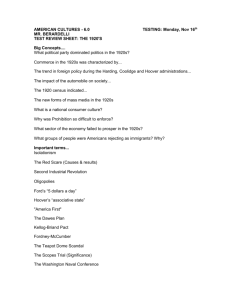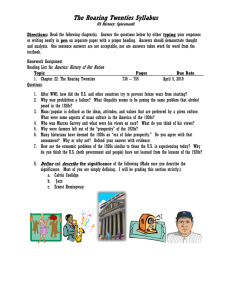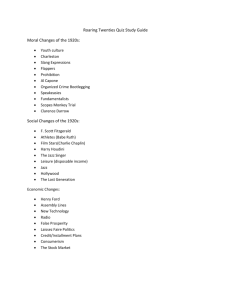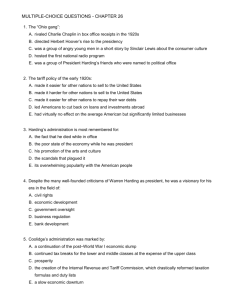World War I and the Politics of Prosperity
advertisement
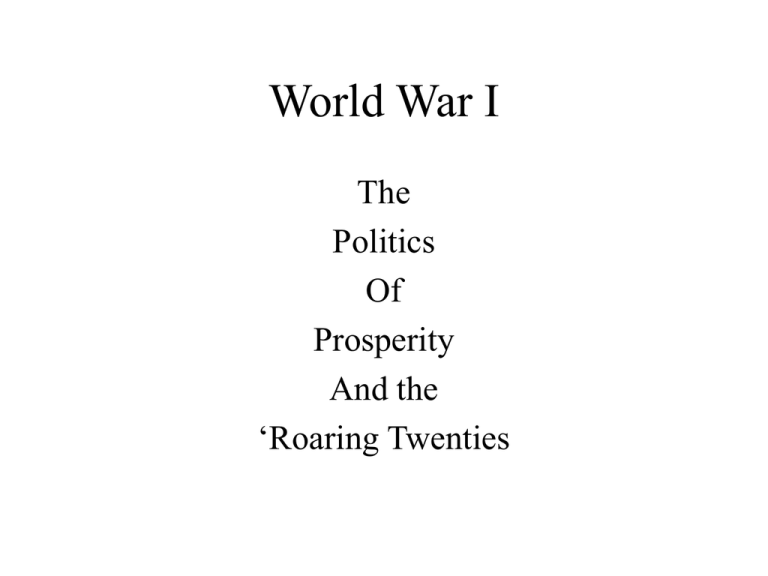
World War I The Politics Of Prosperity And the ‘Roaring Twenties World War I “Some Damned thing in the Balkans will ignite the next European war.” Otto von Bismarck, 1888. June 28th Sarajevo, Bosnia and Serbian politico-a member of the ‘Black hand’ Gavrilo Princip gunned down the presumptive heir to the throne of Austria-Hungary and his wife Sophia—after a month of inept diplomacy, the battle lines were drawn and the alliances fell into motion—By August 1 the guns began to roar in Europe. 4yrs and 15 million lives later, peace once again fell over Europe—though tenuous at best. Wilson’s Reaction • Immediately declared neutrality; thought this might be an opportunity for the American System of Morality and Christian values remake the world order. • America’s economic ties and heritage unfortunately tied it to all sides of the combatants; • Insisted on the right of neutrals to trade with all sides of the warring powers—help America’s sagging economy. Wilson’s Reaction • Unrestricted submarine warfare, the sinking of the Laconia and the Lusitania made it abundantly clear neutrality would be difficult; • 1916 election he ran on the neutrality ticket “He kept us out of war.” • Zimmerman Telegram and other issues dragged us into war. Wilson’s Reaction • By 1917, after all the neutral shipping sunk and lives lost; unrestricted warfare on American shipping; • The Zimmerman telegram, no choice but to ask for a declaration of war; • Some disagreed, Jeannette Rankin dissented as did some others. America Goes to War • No longer just arsenal for Democracy—we now fought to make democracy safe for the world—to end all wars … • Jumped into a war footing and business and the economy boomed—women and AfricanAmericans prospered because of the boom. • One reason for the Great Migrations of AfricanAmericans and Latinos—looking for work. America Goes to War—Versailles Treaty • Selective Service Act • Race issues, The Houston Riot—lashing out against mistreatment—AfricanAmerican veterans fought back and killed 17 whites— discharged, tried and many were hanged; • 100% Americanism— distrusted anyone not considered loyal to America; • Schenck vs. U.S. upheld the Espionage Act—illegal to use the mail for anti-war pamphlets. Pandemic Flu-Spanish Influenza 1918 • Began with American Soldiers at Fort Riley— transported to Europe—by the time it ends 50 million people are dead—more than in the war; • Everyone somewhere is touched by the Pandemic; • Strange it attacks the 15 to 40 yr olds, lungs fill up with blood, swell and they drown--terrible Politics of Prosperity • WWI did not make the world safe for Democracy—did lay the foundation to American global economic dominance; • Culture of consumerism, better working conditions, better wages, insurance, personal investments, consumer credit; Exploding middle class Politics of Prosperity • What role did technology play in shaping the economy of the 1920s? The culture of the 1920s? • Compare the relationship between big business and government during the 1920s to that of the ‘Gilded Age.’ • How did the automobile affect American society? The economy? • If Ronald Reagan, Herbert Hoover, and Andrew Mellon were in a bar, a sign stated, “sorry, our drinks don’t trickle down” who would be the first to leave? Politics of Prosperity • This “New Era” was marked by prosperity and opportunity; • The transition from War economy to peace economy caused economic dislocation for many, loss of income for farmers, stricter Race relations and the re-emergence of “Nativism” against foreign immigrants; • Still, many reveled in the new culture of consumerism. Politics of Prosperity • 1920s elected three republican Presidents—each promised to promote normalcy and prosperity. • Warren G. Harding—platform coined “Return to Normalcy.” Very conservative—but administration ridden with corruption and scandal. Died of a stroke in 1923. • Calvin Coolidge assumed the executive; quickly to repair the scandal ridden administration—a honest man. Elected outright in 1924. Politics of Prosperity • Coolidge was basically okay executive; distrusted the media—so he said very little—”Silent Cal.” • One term President—preferred to fish and be with family—he did cut taxes, kept tariffs rather high(helped industry, hurt farmers). Very popular for some oddity of reason. • Herbert Hoover, very qualified for the office. Sec of Commerce, successful relief program for Europe after WWI—economy busted after he began his duties. Business Boom, 1920s • Technology and Consumer spending: – – – As industrial economy matured, more consumer goods became available Improved productivity helped keep prices down How did it accimplish this? Economy experienced steady growth and expansion— three factors fueled this success: 1) Machines 2) Factories 3) The process of standardized Mass production Business Boom, 1920s • These three factors create a self-perpetuating cycle: • Standardized mass production led to, • Better factory machinery, • Higher production, higher wages, • Increased consumer product and more demand for consumer product. • Led to more standardized mass production Upward Spiral • There are five main sources of the economic boom: • 1)Effect of WWI on technology. • 2) Scientific Management: “Taylorism” • 3) Rapid increase in worker productivity. • 4)Psychology of consumption • 5) Relations between Government and Big Business. Psychology of Consumption • Thorstein Veblen suggested Americans wanted to get rich with little effort—Theory of the Leisure Class— • Coined the term “Conspicuous consumption” it was a cultural mindset. • Radio, Motion Pictures, Electric appliances, and the Automobile. Automobile • All of these things created leisure time and cultural continuity—none better than the car. • Two popularity factors: • 1) Cost—low price, very affordable: Model T $290; • 2) Consumer Credit— 75% of all automobile purchases were on installment plan Economic Effects • 1) promoted growth of other industries (petroleum, rubber, steel); • 2) Helped established the national Highway system—cars required better roads than wagon trails and ruts; road construction big business; • 3) Created a service industry, gas stations, garages, roadside restaurants (Diners) and Motels; added to the desire to plan vactions and see America. Social Effects • 1) A more mobile society—broke down rural and urban barriers; the “Sunday Drive” now in American lexicon. Urban people saw rural America, Rural people drove into cities to see the sites and visit Amusement parks etc … • 2) Weakened family life stability—much easier for the young folks to go out on their own— something beside the farm, go west or wherever; • 3) Weakened traditional morality—escape Parental supervision—”Bedroom on Wheels.” Social Effects Social and Self Image Government and Big Business • 5) American businessmen regained the ‘Gilded Age’ folk hero status—to be admired and not scorned as the reformers had done … • Many began to equate Prosperity with Progress and Cultural evolution; Calvin Coolidge “The business of America is business.” It would be laissez faire at its most grandest—nongovernmental interference … • Coolidge, “Wealth is the chief end of man.” Government Supports Business • 1) High Tariff. The Fordney-McCumber Act (1922); Smoot-Hawley Act (1930)—protected domestic business and industry. • 2) Andrew Mellon-Sec of Treasury (1921-1932) got congress to repeal excessive profit tax (1099 capital gains); reduced rates for corporate and personal income tax—offered business a list of tax loopholes; • 3) Cutbacks in the federal trade Commission (FTC); less government oversight into fair trade policies—not enough personnel to handle all the complaints; Government Supports Business • 4) Herbert Hoover—Secretary of Commerce and President; • Encouraged price fixing and believed government was designed to help businesses grow; • Used two major vehicles to disseminate this message: Chamber of Commerce and National Association of Manufactures Consumer Critics • Materialism was destroying the family unit, spirituality, and the moral fiber of America. • People were amoral and superficial—Look at Jay Gatsby, Babbit and Middletown—The Man Nobody Knows: A Biography of Jesus. Bruce Barton. (1925).
